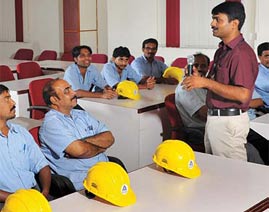Attrition
Our unique employee value proposition and the integrated approach to managing the human resource anchored on ITC’s Group Philosophy and ITC’s HR Philosophy enables attraction, retention and motivation of employees. The overall attrition across management and non management employees for 2010-11 was 13.5%. Within the management cadre, attrition was 13.3%.
Learning and Development
ITC’s Learning and Development initiatives are powered by a strong Learning & Development Vision - ‘To build ITC’s talent and leadership pipeline to power our engines of growth and enhance organisational capability to compete, win in the market place and create enduring value for our shareholders and society.’ The Capability Development Agenda flows from ITC’s Mission, ITC’s Strategic Agenda, the 3 Horizon Growth Strategy and ITC’s Vision.
| In 2010-11, close to 110,000 person-days of formal training were organised for employees at various levels. |
|
| |
 |
Learning and Development initiatives offered during 2010 – 11 were aligned with this agenda. The ongoing core programmes were revitalised to reflect the emerging capability requirements. In addition to core programmes, customised programmes were also offered to address the needs expressed by Businesses, aimed at building specific capabilities at various levels of the organisation.
Planning for initiatives in this area begins much before the commencement of the year and flows from the various Business Plans and capability requirements emerging thereof. Business HR teams work closely with the Corporate HR team in designing and implementing Learning and Development initiatives. Employee training at the factory level is undertaken after assessment of skills gaps or after evaluation of emerging technology or skills needs. The process is proactive and well- structured.
In 2010-11, close to 110,000 person-days of formal training were organised for employees at various levels. In addition, on-the-job learning opportunities were provided to a cross-section of employees supported by inputs from peers and superiors. |

